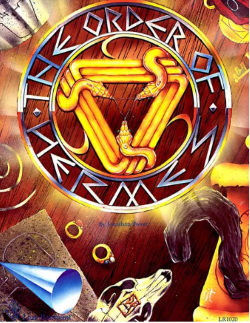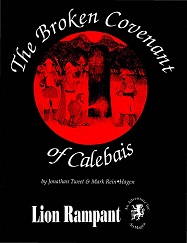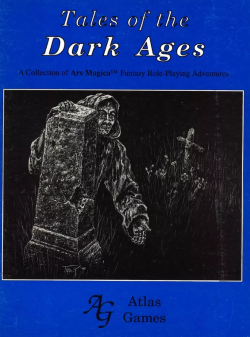John Nephew | |
|---|---|
 | |
| Nationality | American |
| Occupation | Game designer |
John A. Nephew is an American game designer, who has worked primarily on role-playing games.
John Nephew | |
|---|---|
 | |
| Nationality | American |
| Occupation | Game designer |
John A. Nephew is an American game designer, who has worked primarily on role-playing games.
John Nephew started writing Dungeons & Dragons material freelance for TSR in 1986 while he was still in high school, initially writing material for Dragon and Dungeon magazines. [1] : 252 While writing for the magazines, TSR invited Nephew to contribute to projects including Kara-Tur: The Eastern Realms (1988) and Castle Greyhawk (1988), and then the first book he wrote on his own, Tall Tales of the Wee Folk (1989). [1] : 252 Nephew went to Carleton College in Minnesota, where he met the team from Lion Rampant. [1] : 252 Nephew was one of the Minnesota locals who joined Lion Rampant after Jonathan Tweet and Mark Rein Hagen founded the company in 1987 while they were attending St. Olaf College, the traditional rival of Carleton. [1] : 232 Nephew joined the company in 1988, and his roles at the company during his tenure included acquisitions director, editor, and he served briefly as president. [1] : 252
Nephew left Lion Rampant in 1990 when the company moved to Georgia as he did not want to leave Minnesota. [1] : 235 Nephew had purchased a photocopier for Lion Rampant to use, and he made a deal with the company allowing them to take the photocopier with them, while they gave Nephew a license to publish Ars Magica supplements; Nephew then started Atlas Games with assistance from Lion Rampant friends including Nicole Lindroos and Darin Eblom. [1] : 252 In addition to supplements for Ars Magica, Underground , and Cyberpunk , Nephew published Tweet's Over the Edge and supplements, including Wildest Dreams which first brought together Robin Laws, Greg Stolze, and John Tynes near the beginnings of their careers in the RPG industry.
Nephew and Tweet designed On the Edge (1994), a collectible card game based on the role-playing game Over the Edge by Tweet. [1] : 253 Nephew and Jeff Tidball were the only staff that Atlas did not lay off when the CCG industry crashed in 1996, to pay the final printing bills for On the Edge. [1] : 254 Atlas Games made an offer for Everway and Ars Magica when Wizards of the Coast shut down its existing role-playing game lines in 1995 and put them up for bid; Nephew withdrew the Everway bid on February 12, 1996, and Wizards announced on March 6 that it had sold Ars Magica to Atlas Games. [1] : 254 In addition to his major roles, managing Atlas Games and editing its publications, Nephew wrote supplements for Ars Magica, Over the Edge, and d20 over the next few years.
Nephew won a seat on the Maplewood, Minnesota City Council in 2007. [1] : 260 His wife Michelle Nephew gave birth to twins in 2009. [1] : 260
Nephew is a plastics recycling advocate. [2]

Dungeons & Dragons is a fantasy tabletop role-playing game (RPG) originally created and designed by Gary Gygax and Dave Arneson. The game was first published in 1974 by Tactical Studies Rules, Inc. (TSR). It has been published by Wizards of the Coast, later a subsidiary of Hasbro, since 1997. The game was derived from miniature wargames, with a variation of the 1971 game Chainmail serving as the initial rule system. D&D's publication is commonly recognized as the beginning of modern role-playing games and the role-playing game industry, and also deeply influenced video games, especially the role-playing video game genre.

Ars Magica is a role-playing game set in 'Mythic Europe' – a historically grounded version of Europe and the Levant around AD 1200, with the added conceit that conceptions of the world prevalent in folklore and institutions of the High Middle Ages are factual reality. The players' involvement revolves around an organization of magi and their allies and foes both mundane and supernatural. The game was originally developed by Jonathan Tweet and Mark Rein-Hagen, with its first edition published in 1987.

David Lance Arneson was an American game designer best known for co-developing the first published role-playing game (RPG), Dungeons & Dragons, with Gary Gygax, in the early 1970s. Arneson's early work was fundamental to the role-playing game (RPG) genre, pioneering devices now considered to be archetypical, such as cooperative play to develop a storyline instead of individual competitive play to "win" and adventuring in dungeon, town, and wilderness settings as presented by a neutral judge who doubles as the voice and consciousness of all characters aside from the player characters.

Jonathan Tweet is an American game designer who has been involved in the development of the role-playing games Ars Magica, Everway, Over the Edge, Talislanta, the third edition of Dungeons & Dragons and 13th Age, and the collectible miniatures game Dreamblade. In 2015 Tweet released Grandmother Fish, a full-color, full-sized book about evolution aimed at preschoolers. In 2018 Tweet released Clades and Clades Prehistoric, two card games for children and adults which demonstrate the concept of a clade.

Mark Rein-Hagen, stylized as Mark Rein•Hagen, is an American role-playing, card, video and board game designer best known as the creator of Vampire: The Masquerade and its associated World of Darkness games. Along with Jonathan Tweet, he is also one of the original two designers of Ars Magica.

The history of role-playing games begins with an earlier tradition of role-playing, which combined with the rulesets of fantasy wargames in the 1970s to give rise to the modern role-playing game. A role-playing game (RPG) is a type of game in which the participants assume the roles of characters and collaboratively create stories. Traditionally all the participants but one take on characters and determine the actions of their characters based on their characterization and the actions succeed or fail according to a system of rules and guidelines, and one of the participants takes on the role of game master who narrates the story, plays all the non-player characters and determine the challenge rating and the outcome of various actions. Within the rules, the participants may improvise freely; their choices shape the direction and outcome of the games.

The Order of Hermes is a supplement published by Lion Rampant in 1990 for the fantasy role-playing game Ars Magica.

Lisa Stevens is an American editor, CEO and founder of Paizo Publishing, and COO of Goblinworks. She began her career in games in the 1980s, working with Jonathan Tweet and Mark Rein•Hagen to help produce the tabletop roleplaying game Ars Magica. She later worked at White Wolf and Wizards of the Coast before founding Paizo. She announced her gradual retirement from her role in June 2020.
Nicole Lindroos is a game designer who has worked primarily on role-playing games.
Jeff Tidball is a game designer who has worked primarily on role-playing games.
Darin "Woody" Eblom is a game designer who has worked primarily on role-playing games.
Geoffrey C. Grabowski is a role-playing game designer and writer, known primarily as line developer for the 1st edition of the Exalted RPG for White Wolf games from 2001 through 2006. He was described as the "guiding force" of the first edition.

The Broken Covenant of Calebais is an adventure published by Lion Rampant in 1988 for the fantasy role-playing game Ars Magica.

Faeries is a supplement for the fantasy role-playing game Ars Magica first published by White Wolf Publishing in 1991, and by Wizards of the Coast in 1995.

Houses of Hermes is a supplement published by Wizards of the Coast in 1994 for the third edition of the fantasy role-playing game Ars Magica.
The Stormrider is an adventure published by Lion Rampant in 1989 for the fantasy role-playing game Ars Magica.

Tales of the Dark Ages is a collection of adventures published under license by Atlas Games in 1990 for Lion Rampant's fantasy role-playing game Ars Magica.

The Sorcerer's Slave is an adventure released under license by Atlas Games in 1987 for the fantasy role-playing game Ars Magica published by Lion Rampant.